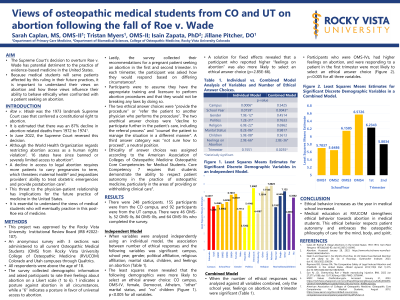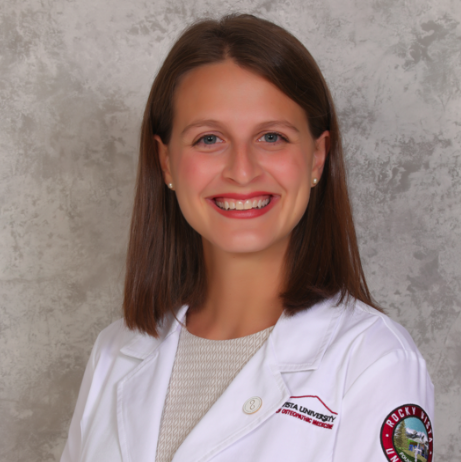Back

Medical Education
Views of osteopathic medical students from CO and UT on abortion following the fall of Roe v. Wade
Friday, March 31, 2023
12:00 PM East Coast USA Time


Sarah Caplan, OMS (she/her/hers)
Rocky Vista University College of Osteopathic Medicine
Lone Tree, Colorado, United States
Presenting Author(s)
Background and Hypothesis: The Supreme Court’s decision to overturn Roe v. Wade has potential detriment to the practice of evidence-based medicine in the United States. Because many medical students will serve patients affected by this ruling in their future practices, it is important to understand their views on abortion. The purpose of this study is to determine medical students’ views on the topic of abortion, and how these views influence their ability to behave ethically when confronted with a patient seeking an abortion.
Methods: An anonymous survey with three sections was administered to all current Osteopathic Medical Students (OMS) from Rocky Vista University College of Osteopathic Medicine (RVUCOM) Colorado and Utah campuses through Qualtrics. All respondents were above the age of 18. The survey first collected demographic information. The survey then asked participants to rate their feelings about abortion on a Likert scale (1 to 6). 1 indicates a posture against abortion in all circumstances, while a “6” indicates a posture in favor of universal access to abortion. Lastly, the survey collected their recommendations on two clinical scenarios: a pregnant patient seeking an abortion in the first trimester and the other in the second trimester. In each trimester, the participant was asked how they would respond based on differing circumstances. The two ethical answer choices were “provide the procedure” or “refer the patient to another physician who performs the procedure”. The two unethical answer choices were “decline to participate further in the patient’s care, including the referral process” and “counsel the patient to manage the situation in a different manner”. A third answer category was “not sure how to proceed”, a neutral position. Participants were to assume they have the appropriate training and licensure to perform abortion procedures and that they would not be breaking any laws by doing so.
Results: There were 248 participants. 155 participants were from Colorado, and 92 participants were from Utah. There were 46 OMS-Is, 52 OMS-IIs, 84 OMS-IIIs, and 64 OMS-IVs who completed the survey. The association between number of ethical responses and the following variables was significant: campus (p=0.0006), school year (p=0.0159), gender (p=7.9E-12), political affiliation (p=1.2E-31), religion (p=6.9E-22), marital status (p=8.2E-06), children (p=5.9E-08), and feelings on abortion (p=2.9E-66). Age (p=0.4258) and trimester (p=0.1551) were not significant. When the number of ethical responses was analyzed against all variables combined, only the school year (p=0.0143), feelings on abortion (p=7.6E-36), and trimester were significant (p=0.0257).
Conclusion: In conclusion, as the year in medical school increased, ethical behavior increased as well. Therefore, medical education at RVUCOM strengthens ethical behavior towards abortion in medical students. This ethical behavior respects patient autonomy and embraces the osteopathic philosophy of care for the mind, body, and spirit.
Acknowledgement of Research Study Sponsors and IRB: The Rocky Vista University IRB granted approval to this research project on 9/14/2022 (IRB #2022-107).
Methods: An anonymous survey with three sections was administered to all current Osteopathic Medical Students (OMS) from Rocky Vista University College of Osteopathic Medicine (RVUCOM) Colorado and Utah campuses through Qualtrics. All respondents were above the age of 18. The survey first collected demographic information. The survey then asked participants to rate their feelings about abortion on a Likert scale (1 to 6). 1 indicates a posture against abortion in all circumstances, while a “6” indicates a posture in favor of universal access to abortion. Lastly, the survey collected their recommendations on two clinical scenarios: a pregnant patient seeking an abortion in the first trimester and the other in the second trimester. In each trimester, the participant was asked how they would respond based on differing circumstances. The two ethical answer choices were “provide the procedure” or “refer the patient to another physician who performs the procedure”. The two unethical answer choices were “decline to participate further in the patient’s care, including the referral process” and “counsel the patient to manage the situation in a different manner”. A third answer category was “not sure how to proceed”, a neutral position. Participants were to assume they have the appropriate training and licensure to perform abortion procedures and that they would not be breaking any laws by doing so.
Results: There were 248 participants. 155 participants were from Colorado, and 92 participants were from Utah. There were 46 OMS-Is, 52 OMS-IIs, 84 OMS-IIIs, and 64 OMS-IVs who completed the survey. The association between number of ethical responses and the following variables was significant: campus (p=0.0006), school year (p=0.0159), gender (p=7.9E-12), political affiliation (p=1.2E-31), religion (p=6.9E-22), marital status (p=8.2E-06), children (p=5.9E-08), and feelings on abortion (p=2.9E-66). Age (p=0.4258) and trimester (p=0.1551) were not significant. When the number of ethical responses was analyzed against all variables combined, only the school year (p=0.0143), feelings on abortion (p=7.6E-36), and trimester were significant (p=0.0257).
Conclusion: In conclusion, as the year in medical school increased, ethical behavior increased as well. Therefore, medical education at RVUCOM strengthens ethical behavior towards abortion in medical students. This ethical behavior respects patient autonomy and embraces the osteopathic philosophy of care for the mind, body, and spirit.
Acknowledgement of Research Study Sponsors and IRB: The Rocky Vista University IRB granted approval to this research project on 9/14/2022 (IRB #2022-107).
